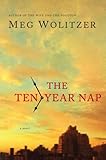 When reading a book that is touted as a "Hugo Award Finalist" and a "Winner of the Philip K. Dick Award," one has high hopes. After having finished Darwinia I am significantly less enamored of well-known science fiction award winners.
When reading a book that is touted as a "Hugo Award Finalist" and a "Winner of the Philip K. Dick Award," one has high hopes. After having finished Darwinia I am significantly less enamored of well-known science fiction award winners.My husband and I discussed why Darwinia had garnered so much attention from the authorities. Especially for a book that was just not that good. I will say, my avid science fiction reading husband liked the book much more than I did. He appreciated the premise on which the book was based. Which is exactly why we think it got the award recognition it did. Which begs the question, what is the premise of the book?
In the year 1912 a "miracle" occurs which changes the world. Europe has disappeared and is replaced with a very foreign land known by contemporaries as Darwinia. A debate emerges between whether this is a biblical proportions miracle or something more sinister. Explorers scout the hinterland à la nineteenth century Livingston expeditions and discover something unexpected. Attention getting, yes. Novel descriptions of a new world to replace the ever-familiar European landscape, yes.
In my opinion, however, that's not enough. The book needed to be either 150 pages shorter, or 600 pages longer. Darwinia is divided into 4 books and it needed to genuinely be written as four separate well-developed novels. Instead the four books are all too short and lack necessary details to full-flesh out the story that Wilson wanted to tell. The other option would have been for Wilson to take out extraneous detail and write a 200 page book. He gives copious details about Guilford Law's first wife which amount to nothing and are not necessary for the story. He goes into great detail describing the world of Darwinia, which is interesting, but only if he were setting up a lengthy trilogy. As it stands, I felt myself falling asleep in the middle of descriptions.
I hadn't heard anything about this book, and I know why. I can't imagine it has a very wide readership. Like I said, the premise is novel. But the book is not fleshed out as it should have been.



